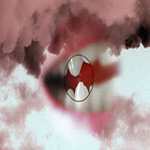 At a family reunion dinner, my great grandfather–a man who was, to me, as noble as a silverback gorilla–ground his molars mercilessly. Our relationship at the time was such that he would occasionally drop tidbits of age-old wisdom on me, and I would not let on that my pockets were stuffed full of colorful summer beetles that I had collected from his garden. It’s fair to say that we weren’t exactly on the same wavelength. But as inscrutable as the old man was, when it came down to such basics as the feeding process, any mystique he’d cultivated just went out the window. Whether he was processing steak gristle or apple sauce, I endured the sound of rhythmic pulverization for the length of the dinner. It seemed impossible that this had been going on for eight decades. No, more likely he had simply reached a point where he knew just how long he needed to last, so why not use it up? To end on zero, there’s nobility in that, surely.
At a family reunion dinner, my great grandfather–a man who was, to me, as noble as a silverback gorilla–ground his molars mercilessly. Our relationship at the time was such that he would occasionally drop tidbits of age-old wisdom on me, and I would not let on that my pockets were stuffed full of colorful summer beetles that I had collected from his garden. It’s fair to say that we weren’t exactly on the same wavelength. But as inscrutable as the old man was, when it came down to such basics as the feeding process, any mystique he’d cultivated just went out the window. Whether he was processing steak gristle or apple sauce, I endured the sound of rhythmic pulverization for the length of the dinner. It seemed impossible that this had been going on for eight decades. No, more likely he had simply reached a point where he knew just how long he needed to last, so why not use it up? To end on zero, there’s nobility in that, surely.
In response, I decided on the spot never again to allow my teeth to touch. My reaction might sound extreme, and I would agree that some lifelong habits can only take root during childhood’s idealism. But the mere thought of enamel on enamel was so offensive that I spent the rest of that day slack-jawed, for which I paid dearly when I failed to heed the portrait photographer’s increasingly vehement pleas.
Gradually, my ability to avoid closing my jaw became second-nature, and it was undetectable to the outside world. A strategic, if unnatural, placement of tongue provided cushion enough to ensure that enamel never touched enamel, and my resolve to this end became an obsession, not to mention a source of vanity. I could smile without raising undue attention, and took great pride when people complimented my extraordinarily intact teeth. I was not shy about brandishing them. Soon after my 25th birthday a friend remarked, “You still have those darling little bumps on the tops of your incisors, like they just came in.”
If there was a price for perfect teeth, it was in the denial in the satisfaction of a solid bite, which I experienced only in reverie. At night I would dream about grinding my molars against each other, and the pain of it was sweet. The clenching pressure was so great that my teeth would squeak like styrofoam, and fracture lines would creep over their contours until they splintered, until gum pressed against gum. Often I would awaken in a panic, though probing never revealed anything more serious than a bloody tongue.
My teeth are worthy of remark not because they’ve changed, but because they’re exactly the same as they were when they first thrust themselves through my gums. Thus, it’s not change in itself that is remarkable, but some measure of contrast between perception and expectation. It’s fair to say that I have some concerns about my teeth, but to illustrate why this is specifically, I need to tell you another story.
Continue reading
 A red sign on the door can’t be a good thing, can it? But we’re a block away, and though I can’t yet read the single word emblazoned on it, hope drains with each step. And indeed, the truck rental place is closed by the time we’re pressing our foreheads against the glass door. As a result of this we’re not just inconvenienced or put out, but well and truly fucked. These are the situations that nightmares are made of, because now we’ll basically have to rely on the moped we rode in on to move all the furniture–by midnight–which is more than patently absurd. So I should be devastated. I am devastated. But secretly I’m also reveling in it. Not in a way that I would dare put to words, especially not then and there. But there’s no denying that there’s a part of me that relishes the sweet kiss of denial.
A red sign on the door can’t be a good thing, can it? But we’re a block away, and though I can’t yet read the single word emblazoned on it, hope drains with each step. And indeed, the truck rental place is closed by the time we’re pressing our foreheads against the glass door. As a result of this we’re not just inconvenienced or put out, but well and truly fucked. These are the situations that nightmares are made of, because now we’ll basically have to rely on the moped we rode in on to move all the furniture–by midnight–which is more than patently absurd. So I should be devastated. I am devastated. But secretly I’m also reveling in it. Not in a way that I would dare put to words, especially not then and there. But there’s no denying that there’s a part of me that relishes the sweet kiss of denial.